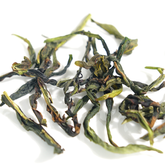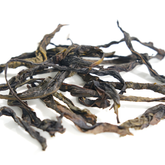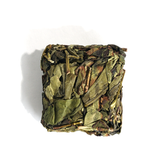Does Jasmine Tea Contain Caffeine? |NPTEA
What is Jasmine Tea?
Jasmine tea is a type of floral tea primarily made from green tea leaves that have been scented with jasmine flowers. However, it can also be produced using black tea, white tea, or other types of tea as the base. Green tea is typically considered the best base for floral teas because it absorbs the jasmine fragrance more effectively. The main production area of jasmine tea is in Hengxian County, Guangxi, China, which is home to the world's largest jasmine tea planting base.
During the production process, jasmine flowers are repeatedly blended with tea leaves, allowing the leaves to fully absorb the floral aroma. The finished tea is characterized by a vibrant green color and a delicate jasmine fragrance. The taste of jasmine tea is refreshing and smooth, with the floral and tea flavors beautifully integrated, resulting in a noticeable aftertaste. It is suitable for daily consumption, especially for those who enjoy mild floral notes. Jasmine tea is gentle and non-irritating, making it a great choice for most people, particularly those looking to relax and relieve stress.

Does Jasmine Tea Contain Caffeine?
Yes, jasmine tea contains caffeine, but in relatively low amounts. The base tea leaves used in jasmine tea are usually green tea or other lightly fermented teas, and all six major types of tea naturally contain some level of caffeine. The caffeine content in green tea typically ranges from 8 to 36 milligrams per cup, while coffee can contain as much as 95 milligrams per cup. The caffeine content of jasmine tea depends on various factors, including the type of tea used, steeping time, and the amount of tea leaves. Generally, lightly fermented teas like jasmine tea contain less caffeine compared to black tea or aged puerh tea.
Moreover, the amount of caffeine released also depends on water temperature and steeping time. Higher water temperatures and longer steeping times can increase the release of caffeine from the tea leaves. Therefore, for those wishing to reduce their caffeine intake, it is advisable to use shorter steeping times and milder water temperatures when brewing jasmine tea. In summary, jasmine tea does contain caffeine, but the levels are low enough that moderate consumption will not lead to excessive caffeine intake, making it particularly suitable for those who want to enjoy floral flavors without consuming too much caffeine.
How to Brew Jasmine Tea
Jasmine tea is highly recommended for beginners! It can be brewed even without special tea utensils. Unlike other types of tea that might require a gaiwan, you can simply use a glass cup to brew jasmine tea.
-
Tea Utensils: Glass cup or gaiwan. A glass cup allows you to enjoy the visual beauty of the tea leaves unfurling in water, while porcelain cups and gaiwans help maintain the tea’s aroma and temperature.

- Water Temperature: Since jasmine tea leaves are relatively delicate, high water temperatures can damage the tea's aroma and make the brew taste bitter. It is recommended to use water heated to about 80-85°C (176-185°F). Boiling water can be cooled for 1-2 minutes to reach the appropriate temperature.
- Tea-to-Water Ratio: A general guideline for jasmine tea is to use 1 gram of tea leaves for every 50 milliliters of water. For a typical 200-milliliter cup, you can use 3-4 grams of jasmine tea. You can adjust the amount of tea leaves based on personal taste, but it’s best not to use too much to avoid a overly strong brew.
Benefits of Jasmine Tea
Jasmine tea is beloved for its unique floral aroma and refreshing taste, but it offers more than just delightful flavors; it also boasts numerous health benefits. Typically made with a base of green tea or white tea, jasmine tea combines the fragrance of jasmine flowers with the nutrients found in tea leaves.
- Rich in Antioxidants:Jasmine tea is high in antioxidants, particularly catechins and polyphenols, which help neutralize free radicals and slow down the aging process. Research shows that the abundant catechins in green tea can significantly reduce cellular damage caused by free radicals, effectively combating aging【1】.
- Promotes Cardiovascular Health: The catechins in jasmine tea have been found to help lower low-density lipoprotein (LDL) cholesterol levels, thereby reducing the risk of heart disease. Studies from Harvard University have linked long-term green tea consumption (including jasmine tea) with a significant reduction in heart disease risk【2】.
- Aids Weight Loss: The combination of caffeine and polyphenols in jasmine tea can enhance metabolism and accelerate fat breakdown. Research indicates that green tea extracts can significantly increase calorie expenditure and fat oxidation, helping to maintain a healthy weight【3】.
- Reduces Stress and Elevates Mood: The aroma of jasmine has a relaxing effect and has been shown to regulate mood through olfactory pathways, alleviating anxiety and stress. Studies have demonstrated that jasmine aroma can stimulate GABA receptors in the nervous system, helping to lower anxiety levels【4】.
- Boosts Immunity: The polyphenols and flavonoids in jasmine tea have antibacterial and antiviral properties. Research shows that tea polyphenols can effectively inhibit the growth of various bacteria and enhance immune function, helping to prevent infections【5】.
- Serafini, M., & Del Rio, D. (2004). "Tea polyphenols: antioxidant and biological activities."
- Kuriyama, S., et al. (2006). "Green tea consumption and mortality due to cardiovascular disease."
- Hursel, R., & Westerterp-Plantenga, M. S. (2010). "Catechin- and caffeine-rich teas for control of body weight."
- Kiecolt-Glaser, J. K., et al. (2008). "Aromatherapy and stress: jasmine’s impact on stress relief."
- Friedman, M. (2007). "Overview of antibacterial, antitoxin, antiviral, and antifungal activities of tea flavonoids and teas."
Frequently Asked Questions
1.Does jasmine tea help you sleep? Jasmine tea's base is typically green tea, which contains caffeine. If you are sensitive to caffeine, it is recommended to avoid drinking it at night.
2.Is jasmine tea herbal? Herbal teas are not classified as true teas because they do not come from tea leaves. Jasmine tea typically uses green tea as its base.
3.Is jasmine tea green tea? While jasmine tea is usually made with green tea, it is not categorized strictly as green tea due to the different production methods involved. The base tea is mixed with jasmine petals multiple times to allow the tea leaves to absorb the floral aroma, and then the jasmine petals are removed to produce the final jasmine tea product.
SEE MORE ABOUT CHINESE TEAS
If you have questions about selecting tea:
Learn-more-about-chinese-tea
If you have questions about the benefits of tea:
Health-benefits-of-chinese-tea
If you have questions about brewing tea:
How-to-brew-loose-leaf-tea






